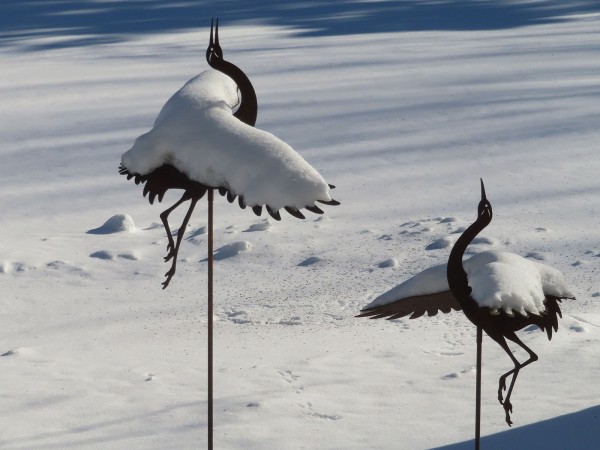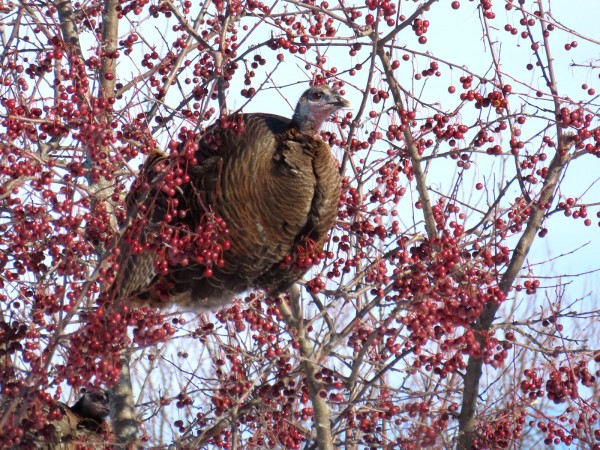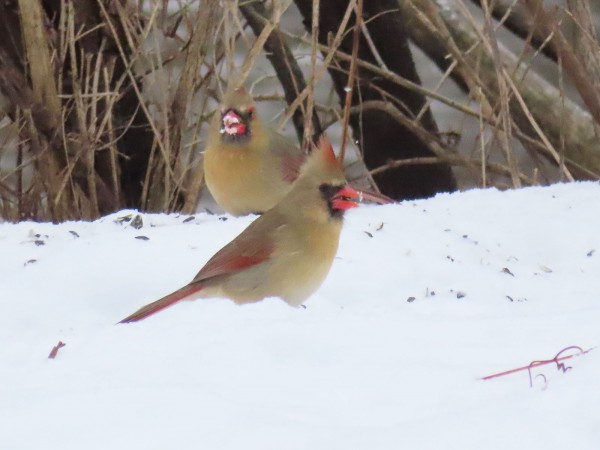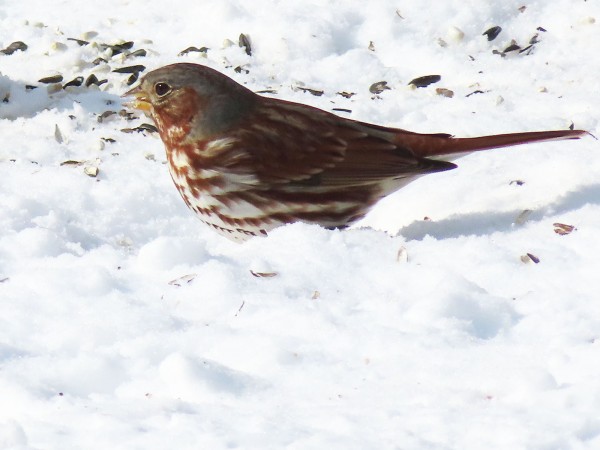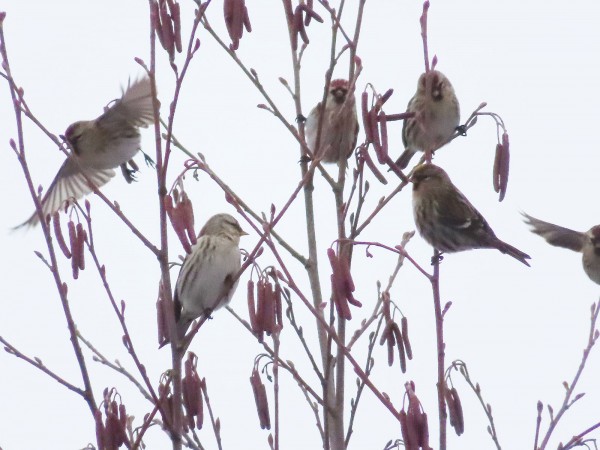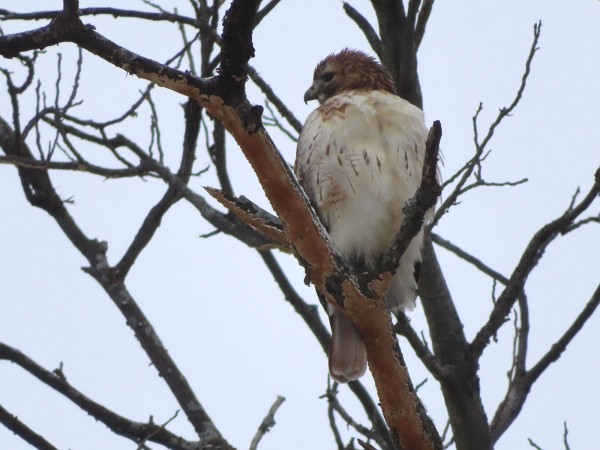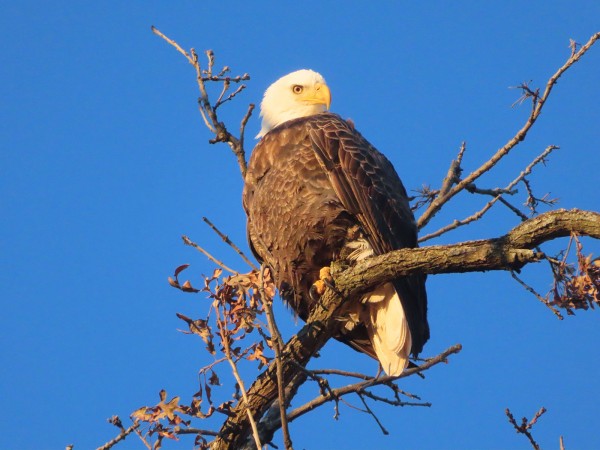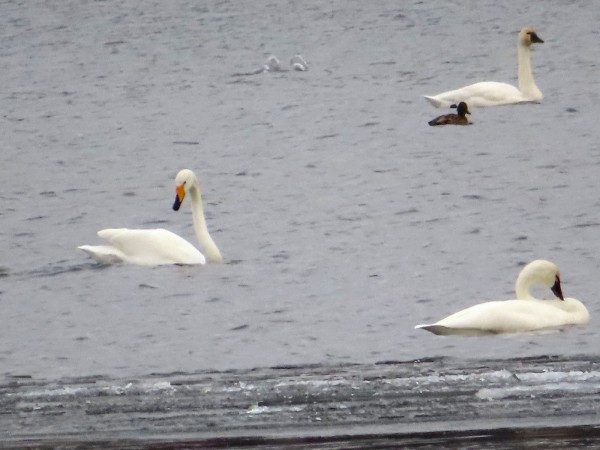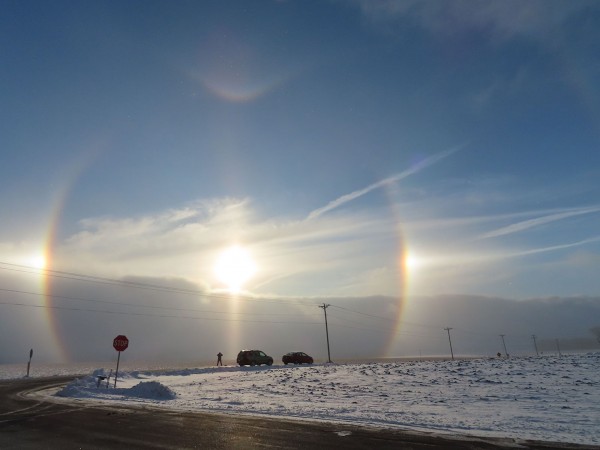Chuck's Birding Report #94
28 December 2021 - 03 January 2022
Dear fellow flock of birders,
Sunrise has reached it latest time at 7:29 am. It will stay at 7:29 until Jan. 6th when it is 7:28 am and will continue to fall slowly. On Jan. 31 it will be 7:13 am. Sunset times increase more rapidly thus the increase in day length is mainly caused by the time of sunset rather than the time of sunrise.
Snow is finally arriving. The cross country skiers and snowshoers have been numerous in the Arb the past few days. I measure rain in the summer with a normal rain gage. In the winter I measure snowfall by the amount of snow the builds up on the wings of our metal Sandhill Cranes. See the included photo.
The Wild Turkeys have changed their behavior recently. They used to eat the crabapples that fall on the ground. Now that the snow is 4-5 inches deep all the crabapples on the ground are covered by snow. They could sweep away the snow with their feet but that’s too energy intensive. They opt for the second choice, fly up into the crabapple trees and pick the fruit directly from the branches. Today I saw 11 Wild Turkeys in the Crabapple Collection. Two were on the ground while 9 were in the trees plucking and swallowing whole crabapples. It’s fun to watch the turkeys walk along the thin branches. To maintain balance they flick their tails up and down. I’m a real fan of that movement. The included photo shows one turkey feeding in a crabapple tree.
Also today I went to the Spring Trail Pond (aka the Duck Pond). The pond stays open all winter because it is fed by a spring whose water temp is 50-55 degrees. All the birds in the area can bathe and drink fresh water from the pond including the 120 Mallards and 22 Wild Turkeys I saw today. Food is obtained from many feeders just across the street. Today I saw numerous Northern Cardinals (12) and 1 Fox Sparrow. Photos of two female Northern Cardinals and one Fox Sparrow are included.
I’m always looking for a couple species of birds that are only here in the winter. They are Pine Siskins and Common Redpolls. I’ve only seen a couple singles and one pair of Pine Siskins. I have not seen any small flocks. On the other hand the number of Common Redpolls has steadily increased. It started with a couple, then increased to 20 and 25. Most often they have been feeding on the seeds in the female catkins of the Whitespire and Sweet Birches just south of the Crabapple Collection. They often feed with the American Goldfinches eating the same seeds. The other day I was standing directly beneath where both the Redpolls and Goldfinches were feeding and suddenly felt something showering me. It turned out to be the seeds and bracts (the supportive structures between the seeds) of the female catkins. Next time you go to the Arb look under these birches to see seeds and bracts. What do they look like? My best day was last Friday, the last day of December and 2021. I was standing on Icke Boardwalk and saw a large flock of small birds feeding on the European Alders and their female catkins. I immediately saw many Common Redpolls and a few American Goldfinches. A couple time the whole flock flew over me and I judged the flock to be about 50 birds. Since I saw mostly Redpolls when feeding I estimated that 40 were Redpolls and 10 were Goldfinches. That was indeed my highest count of Redpolls. A photo of a few Redpolls is included.
About every other day I see one or two Red-tailed Hawks flying around the Arb. They can perch on the light posts, on the roof of the Visitor Center or on snags around the edge of Curtis Prairie. Included is a photo of one perched in a tree at the edge of East Curtis Prairie. I saw it fly down and try to catch something to eat. It came up empty taloned.
The next two photos are of birds that I saw either on Picnic Point or University Bay, both of which are in Dane County. Today I walked the length of Picnic Point. I heard a couple Bald Eagles calling and looked up to see if I could find them. One was flying over University Bay while the other was perched at the top of a tree. All together I saw 8 Bald Eagles. Most were adults with white heads and tails but two were immatures with mostly dark brown feathers and some patches of white here and there. A photo of a perched, adult Bald Eagle is included. Many eagles are around the lakes feeding on fish before the lakes freeze completely.
The second photo was a real surprise to me. I took a photo of it on December 23 because it looked different from the many Tundra Swans in the University Bay. I actually forgot about the bird for a few days and then someone asked me if I had seen the Whooper Swan. The what? It is a large swan and the beak is yellow at the base and black at the tip. Then I remembered the photo I had taken of this unique swan. It turns out it is the Whooper Swan. This swan is from Europe. I was amazed. A photo of the Whooper Swan (pronounced hooper) that I took is included.
My last photo was taken one year ago on 3 Jan 2021 at the junction of Pheasant Branch Rd and Fisher Rd. A few of us had just seen a Snowy Owl out in a field of corn stubble. It was about 8:15 am. We were all over the moon at the finding. But then another sight developed that actually was even more impressive. This occurred at about 8:45am. As we saw the sun rise a little higher in the sky a Sun Halo developed. It’s a circle or partial circle around the sun. At the sides are rainbow like arcs called Sundogs. At the very top was an upside down, flattened triangle that is another type of arc. The whole structure is formed by hexagonal ice crystals in the air. It was an amazing sight. The sight of the Snowy Owl and Sun Halo almost simultaneously was truly and magical experience that I will remember forever. Have you ever seen a Sun Halo with all these different parts? I hope you can someday.
That’s the bird report for the past week and more.
I wish you all a Happy New Year and good birding in 2022,
Chuck

